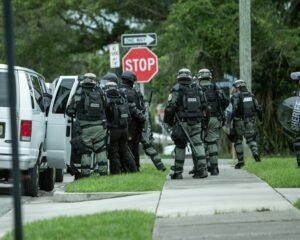How to Find Police Jobs in Your Area
Securing a police job in your local area is an honorable and impactful career choice, offering stability, community involvement, and opportunities for growth. Here is a comprehensive guide designed to assist you in successfully locating and applying for police jobs near you, along with essential steps to prepare for this rewarding profession.
Understanding the Requirements for a Police Job
Before applying, it’s essential to be fully informed of the basic eligibility requirements for a police job in your area. Here are some of the general prerequisites:
- Age Requirement: Most police departments require applicants to be at least 21 years old, although some may allow individuals as young as 18.
- Educational Qualifications: A high school diploma or GED is often the minimum requirement, but many departments prefer candidates with some college education or relevant coursework in criminal justice.
- Citizenship: U.S. citizenship or permanent residency is a common requirement for police jobs in the United States.
- Physical Fitness: Physical readiness tests are a standard part of the hiring process. Being physically fit is crucial, as this line of work often demands high stamina, strength, and agility.
- Background Check: Applicants should have a clean criminal record, as departments conduct thorough background investigations, including a review of driving records, credit scores, and any criminal activity.
- Psychological Evaluation: A psychological assessment may be conducted to determine an applicant’s suitability for a stressful and demanding job.
Meeting these qualifications is the first step toward finding and securing a police job in your area.
Steps to Find Police Job Openings
1. Check Local Police Department Websites
The official websites of local police departments often list current job openings. Departments regularly update their sites with details about available positions, requirements, and application deadlines. Most websites have a dedicated “Careers” or “Employment” section where prospective applicants can view open positions, descriptions, and application requirements.
2. Visit City or County Government Websites
Local government websites are another valuable resource for locating police job openings. These websites may feature a central job portal with postings for all public service jobs, including law enforcement positions. Often, city or county websites offer additional resources for prospective police officers, such as information on hiring events, qualification tests, and career fair announcements.
3. Explore State Police and Highway Patrol Websites
If you’re interested in state-level law enforcement, visiting your state’s police or highway patrol websites is essential. State law enforcement agencies, such as highway patrol or special investigation units, often hire individuals willing to work beyond local jurisdictions. These websites provide valuable details on the types of positions available, including specialty roles in areas like drug enforcement, forensics, and criminal investigations.
4. Utilize Job Search Engines and Websites
Popular job search platforms like Indeed, LinkedIn, ZipRecruiter, and GovernmentJobs.com offer specific filters to search for law enforcement positions in your area. These platforms provide a wide range of options and allow you to set alerts for new postings, helping you stay informed about the latest police job opportunities.
5. Attend Local Career Fairs and Job Expos
Career fairs, especially those hosted by government agencies or local law enforcement academies, are excellent venues to meet recruiters and ask questions directly. Some events are exclusively for law enforcement positions, featuring recruiters from multiple departments. This can provide insight into the hiring process and give you a chance to make a positive impression on hiring officers.
Preparing Your Application for a Police Job
1. Crafting a Strong Resume
Your resume should highlight relevant skills, such as physical fitness, communication, leadership, and problem-solving abilities. Focus on experience that shows discipline, teamwork, and commitment. If you have any military experience or previous roles in security, these should be prominently displayed. Tailor your resume to emphasize skills that align with the values and duties of a police officer.
2. Writing a Compelling Cover Letter
A well-written cover letter can set you apart from other applicants. In your cover letter, express your dedication to serving and protecting the community. Mention specific motivations for joining law enforcement and discuss any experiences that make you uniquely qualified for a police job. Personalize the letter for each application to demonstrate genuine interest in that particular department.
3. Gathering References
Having credible and professional references is critical. Choose individuals who can vouch for your character, work ethic, and reliability. Ideal references include former employers, teachers, or community leaders who can attest to your suitability for a demanding and responsible role in law enforcement.
Navigating the Police Job Selection Process
1. Written Exam
Most departments require candidates to pass a written examination assessing critical thinking, reading comprehension, and basic math skills. This exam varies between departments but is generally designed to measure cognitive abilities and suitability for police work.
2. Physical Agility Test
The physical agility test is a critical component of the hiring process. Tests may include activities such as running, jumping, obstacle courses, and strength-based exercises. Prepare for this stage by maintaining a consistent fitness routine that includes cardio, strength training, and flexibility exercises.
3. Psychological Assessment
A psychological evaluation is often required to determine your mental resilience and suitability for a challenging work environment. This assessment may include an interview with a psychologist and standardized tests designed to gauge your stress tolerance, decision-making skills, and emotional stability.
4. Background Check and Polygraph
A thorough background investigation will be conducted to review your criminal history, financial history, and even social media activity. Some departments also administer a polygraph test to verify information provided during the application process. Be honest and transparent throughout this stage to avoid complications.
5. Oral Board Interview
The oral board interview typically involves a panel of officers who ask a series of questions to assess your integrity, judgment, and interpersonal skills. Prepare for this interview by practicing responses to common police interview questions, such as why you want to be a police officer, how you handle stress, and how you would approach conflict resolution.
Specialized Police Career Options
In addition to general police officer roles, there are various specialized positions you may consider once you have experience in the field. Specialized positions often require additional training and qualifications, but they offer unique opportunities to serve the community in different capacities:
- Detective: Investigates complex cases, such as homicides, thefts, or fraud.
- K-9 Officer: Works closely with police dogs for drug detection, search, and rescue missions.
- SWAT Team Member: Handles high-risk operations that require specialized tactics.
- School Resource Officer: Provides security and mentoring within schools.
- Traffic Enforcement Officer: Specializes in enforcing traffic laws and investigating accidents.
These positions may require additional certification or training and offer unique career progression paths within the police force.
Enhancing Your Qualifications
1. Consider Additional Education
Pursuing a degree or certification in criminal justice, psychology, or law enforcement can enhance your eligibility for police roles. Many departments value candidates with higher education, as it demonstrates dedication and understanding of the field.
2. Gain Relevant Experience
Volunteering, internships, or roles in security can provide practical experience and insights into law enforcement work. Some departments offer ride-along programs, which give you a chance to shadow a police officer and experience a day on the job.
3. Develop Strong Community Connections
Community service or involvement in local organizations can demonstrate your commitment to serving others. Positive community connections not only enhance your application but also prepare you for a career rooted in public service.
Conclusion
Finding a police job in your area involves dedication, preparation, and perseverance. By understanding the application process, meeting physical and educational requirements, and knowing where to look for job openings, you can position yourself as a competitive candidate. Take advantage of local resources, government websites, and career events to find the best opportunities in law enforcement.












